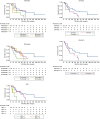Comparison of tumor regression grading system in locally advanced esophageal squamous cell carcinoma after preoperative radio-chemotherapy to determine the most accurate system predicting prognosis
- PMID: 31032095
- PMCID: PMC6465493
- DOI: 10.21037/jgo.2018.12.01
Comparison of tumor regression grading system in locally advanced esophageal squamous cell carcinoma after preoperative radio-chemotherapy to determine the most accurate system predicting prognosis
Abstract
Background: Nowadays, preoperative radio-chemotherapy is a standard treatment for locally advanced esophageal squamous cell carcinoma (ESCC). Tumor regression grade (TRG), referring to a classification of cancer response to preoperative treatment, can predict a prognosis of survival. Many TRG systems are proposed for use in esophageal cancer, but none of them has become standard grading system. This research compared five TRG systems, including Mandard system, Chirieac system, Schneider system, Hermann system, and Japan Esophageal Society (JES) system, to find the most accurately predictive system.
Methods: We recruited 37 participants with locally advanced ESCC from 2006 to 2014. All of them were treated with radio-chemotherapy followed by esophagectomy. The resection specimens were evaluated microscopically for percentage of viable residual tumor comparing with tumor bed, number of positive lymph nodes and, consequently, assigned TRG grade according to each TRG system. Kaplan-Meier (KM) graphs were used to describe the median survival time. Log-rank tests and cox proportional hazard regression models were used in assessing associations between TRG systems and survival. Proportional hazard assumptions were evaluated on the basis of Schoenfeld and log-log plot. Akaike information criterion (AIC) values and pseudo R-squared values assessed model fit. All statistical tests were two-sided.
Results: The KM graphs displayed overlapped curves in all TRG systems. The log-rank tests revealed that Schneider, JES and Mandard systems were statistically associated with overall-survival (P<0.05). Only the multivariate cox regression analysis of Schneider system showed the statistically significant hazard ratio (P=0.037). Schneider system also had the best AIC and pseudo R-squared values.
Conclusions: Schneider system might be the best predictive system. However, the overlapped KM curve opposed. This study had limitation due to small number of participants. More participants were needed to confirm our findings.
Keywords: Esophageal cancer squamous cell carcinoma; neoadjuvant therapy; prognosis.
Conflict of interest statement
Conflicts of Interest: The authors have no conflicts of interest to declare.
Figures
Similar articles
-
Tumor regression grade combined with lymph node status in esophageal squamous cell carcinoma after neoadjuvant chemoradiotherapy.Cancer Med. 2022 Oct;11(19):3623-3632. doi: 10.1002/cam4.4748. Epub 2022 Apr 17. Cancer Med. 2022. PMID: 35434935 Free PMC article.
-
Comparison of five tumor regression grading systems for gastric adenocarcinoma after neoadjuvant chemotherapy: a retrospective study of 192 cases from National Cancer Center in China.BMC Gastroenterol. 2017 Mar 14;17(1):41. doi: 10.1186/s12876-017-0598-5. BMC Gastroenterol. 2017. PMID: 28292272 Free PMC article.
-
Residual Cancer Volume Predicts Clinical Outcome in Patients With Esophageal Squamous Cell Carcinoma After Neoadjuvant Chemotherapy.Int J Surg Pathol. 2019 Oct;27(7):713-721. doi: 10.1177/1066896919855760. Epub 2019 Jun 17. Int J Surg Pathol. 2019. PMID: 31203677
-
[Grading of tumor regression of gastrointestinal carcinomas after neoadjuvant therapy].Pathologe. 2022 Feb;43(1):51-56. doi: 10.1007/s00292-021-01041-5. Epub 2021 Dec 23. Pathologe. 2022. PMID: 34940918 Free PMC article. Review. German.
-
Interpretation of Tumor Response Grade following Preoperative Therapy for Gastric Cancer: An Overview.Cancers (Basel). 2023 Jul 18;15(14):3662. doi: 10.3390/cancers15143662. Cancers (Basel). 2023. PMID: 37509323 Free PMC article. Review.
Cited by
-
18F-FDG PET/CT Metrics Are Correlated to the Pathological Response in Esophageal Cancer Patients Treated With Induction Chemotherapy Followed by Neoadjuvant Chemo-Radiotherapy.Front Oncol. 2020 Nov 27;10:599907. doi: 10.3389/fonc.2020.599907. eCollection 2020. Front Oncol. 2020. PMID: 33330097 Free PMC article.
-
Comparative analysis and optimization of tumor regression grade assessment systems in neoadjuvant therapy for esophageal squamous cell carcinoma.BMC Cancer. 2025 Aug 20;25(1):1341. doi: 10.1186/s12885-025-14726-4. BMC Cancer. 2025. PMID: 40836336 Free PMC article.
-
Shrinkage versus fragmentation response in neoadjuvantly treated oesophageal adenocarcinoma: significant prognostic relevance.Histopathology. 2022 May;80(6):982-994. doi: 10.1111/his.14644. Epub 2022 Apr 6. Histopathology. 2022. PMID: 35352847 Free PMC article.
-
Development of an Interpretable Deep Learning Model for Pathological Tumor Response Assessment After Neoadjuvant Therapy.Biol Proced Online. 2024 Apr 17;26(1):10. doi: 10.1186/s12575-024-00234-5. Biol Proced Online. 2024. PMID: 38632527 Free PMC article.
-
Prognostic and predictive values of interim 18F-FDG PET during neoadjuvant chemoradiotherapy for esophageal cancer: a systematic review and meta-analysis.Ann Nucl Med. 2021 Apr;35(4):447-457. doi: 10.1007/s12149-021-01583-x. Epub 2021 Jan 20. Ann Nucl Med. 2021. PMID: 33471289
References
-
- Fact Sheets by Cancer. Globocan.iarc.fr. 2018 (cited 20 September 2018). Available online: http://gco.iarc.fr/today/data/factsheets/cancers/6-Oesophagus-fact-sheet...
LinkOut - more resources
Full Text Sources

